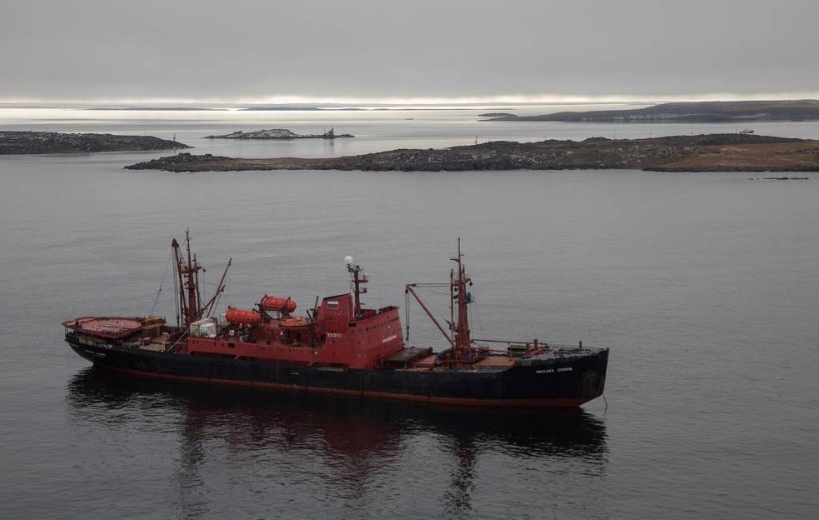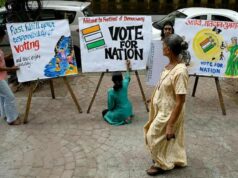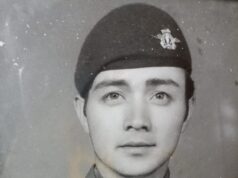No sun, no stars for six months. How to work and live in the North
The chain of meteorology stations stretches to Chukotka – and at every station people are waiting for the supplies

Mikhail Somov scientific-research vessel
Every year, the Mikhail Somov research/survey vessel departs from Arkhangelsk, carrying food, construction materials, equipment and personnel. People working at hard-to-reach meteorology stations know the ship very well. Getting to a “polar shift,” or leaving for a holiday, or to receive supplies once in 12 months – this is what the ship is used for. It is the seventh voyage this year. The final destination is the Wrangel Island between the East Siberian and Chukchi seas. More than 30 stations to visit and six Arctic seas to cross.
The grey White Sea and the blue Barents Sea give way to the green Kara Sea – the third sea on the vessel’s eastern route. Red colors, the colors of autumn tundra, retreat giving way to the white color – the sign of the approaching polar night and long winter. The chain of stations stretches to Chukotka – and at every station people are waiting for the supplies.
The nature is taking over anything it can. Houses decay in the salt and winds. Grass is growing though somebody’s past and hopes. Broken windows, houses with no people.
The modern weather station module looks like a space apparatus on an alien planet. We are in Amderma.
– People can get used to anything, and may not really notice these ruins, – Lidiya Ivanchenko, a meteorologist, says. In the past the populated settlement was full of life: specialists from across the country used to come to work here.
It was a place where fluorite was mined. For 37 years, Amderma hosted an air regiment. Direct flights to Moscow departed from the local airport. The city was known for a permafrost station, a sea port, and for the oil and gas exploration.
Lidia comes from the Volgograd region. She used to live in the Mordovia region, and then studied in Moscow. At the age of 19 together with husband she came to their first station. She moved to Amderma after the daughter was born.
– You wouldn’t believe how many kindergartens we used to have! At the polar station – Sunny, at the port – Snowflake, at the military base – Star, the geologists had Brook, the settlement had Chamomile. Nowadays, children are few: the school and kindergarten share one building.
In winter, 1999, fire destroyed the two-storey house, where Lidia lived with the daughter. The disaster began in a flat downstairs. Lidia and the child had to jump through the window – into the darkness and snow. The girl was badly injured. The sanitary helicopter brought the mother and daughter to hospital in Naryan-Mar, the nearest city. From that day, Lidia said, she had to start life from the very beginning.
– Living here is possible only if you are working, – Lidia makes tea and emphasizes the last word by breaking it into syllables. Tea in the North is a tradition. The life is too cold, too isolated. Realizing how valuable the warmth can be comes to people after they get truly cold.
Lidia’s daughter has grown up and left; the mother has passed away and Lidia failed to make it to the funeral.
On every house around the station we can see red-and-white signs: “Watch polar bears!” That’s right, the people live next to the predators. Nobody would go outside without a hand flare.
– Not so long ago, a bear came to the Nenets. It’s 30 km from the sea. It cut a few deer. The people would frighten it off – it would walk away to return soon, – Lidia shows pictures, she took through the station’s windows – bears on every picture.
All passing away settlements seem alike. Not for their abandoned houses or the waste, but due to the feeling of failed hopes.
– We came here in the 1980s, young graduates we were. Since then, many have left, and we have been hanging around. We all are about the same age – between 45 and 60. About 200 people live in the settlement now. We know each other.
It is tough to decide to move from the North. Whenever far from Amderma, Lidia says, she feels alien.
– From holidays, we are rushing back – our home is here. Life in cities is different. We go there only to visit somebody. I haven’t felt comfortable there lately. We’ve got used to living here – it’s impossible to rip us from here, only by uprooting.
The last cucumber is still hanging lonely inside the greenhouse. The crops have been harvested. Nothing strikes as awkward, until you imagine that those vegetables grow at the Marresale station in the western part of the Yamal Peninsula. In the middle of the tundra. The entire soil has been shipped from the mainland.
– What matters here are the health and reliable diesel [generators], to have light, heat and communication, – engineer-meteorologist Igor Mitko said. – We have three working [generators] now. Geologists have left their reserved generator to us, saying – that’s in case of a nuclear war.
Igor graduated from a college in Novosibirsk. Before the military service, he managed to work as a meteorologist on the Kolyma. After the service, together with a friend, he decided to work at a weather station. The men filed applications to Magadan – without special invitations it was impossible to get to the city. The friend received an invitation, and Igor – not.
Only a few years later, Igor learned that the invitation letter did come, but his mother received it and tore into pieces. For more than 30 years, Igor had been working as an armored truck driver dreaming to return to the station.
– I knew I must come here. Sure, I’ve forgotten the skills, and many things have changed. It took me a year to re-obtain the profession.
The most depressing time at a station is the polar night. The darkness falls in November, and the first sun rays will appear only in mid-January. At first, they will barely peep behind the horizon. But anyway, after the complete darkness, even hopes for the light are bringing joy.
In summer, it is the opposite – the daylight all the time.
– It is surprising to see the first star. Then, you realize – it’s been six months you haven’t seen a star, – Igor said. – Very many things are surprising here. No trees, for example. We miss them. Bears come only rarely, just once or twice a year. At the same time, many Arctic foxes, one of them even managed to bite my heel. Luckily, I had boots on. Sometimes, the Nenets may come. If not, we may be staying here for months without seeing people.
Igor recalls how he was working on the mainland – back then he was too nervous all the time. Here, at the station, there are no reasons to worry. “You know, how we live: whenever you are moody – stay in your room until you cope with it.”
– Quite many are unable to stay here. They come for just one year, and that’s it.
– It’s about caring for what you do. I knew where I was going. In no time I’ve got used to the timing, for six weeks I was working here on my own. It happened so that one colleague was away on holiday, and for the other I had to call for a sanitary flight.
The first snow caught us in Dikson. The gloomy sky. A half-transparent white-threaded cover on the ground. The helicopter stirs up small waste, and the sharp snowflakes are cutting face in a chilly rush.
Nobody lives on the Dikson Island. In 2009, everyone was sent over to the mainland. The houses are empty. Only the weather station and an airport work there. The available transport here is the shift-trucks (KamAZ or Ural trucks with trailers on top, used to transport workers). It’s safe to take them, as when in Dikson you never know who you may meet – people or bears.
Stories about the North are full of romantic fleur. More than any other part of the world. Such stories are told by those who have not worked or lived here. The North is not just picturesque lights, adventures, or scenic images. The North is the polar night with ice fields running into the black sky, it is the freezing cold, the days-long storms, the wind, the loneliness and despair. The weird tough reality, full of hardship, compromise and overcoming.
What is the white color? It is the flag of laying down arms in front of the far-away world. White is a sterile surgery room. White is the primed canvas longing to meet a brush.
Very soon, a layer after layer, the white will wrap all the houses, the views, the roads. It will manifest the emerging of something new.
– I come from Crimea. I used to have a dream to visit the North, that’s why I am here, – says Darya Kopayeva, an engineer-meteorologist. – The idea came from Soviet cartoons.
She graduated from a college in Tula (only a few graduates are working at stations now) and left for the Arkhangelsk region – to Moseyevo.
– Here, amid the virgin nature, I can see and appreciate what formerly I used to take for granted: good weather, rainbows, warm rains. One day, at six in the morning, I skied through the forest to register the snow level, and here – a fox runs out onto the path. It’s sunny, the fox is brightly red, as if shining.
At the station in Moseyevo, Daria worked for two years. The only complicated aspect was the living conditions – they stayed in a village house with no conveniences. To Dikson she came last summer.
– Whenever work is away from the civilization – it’s easier: you won’t miss the mainland. But if the work is nearby, next to a village, then you keep comparing, and say – it’s better at home.
Daria is confident – people return to the point where they have coped with problems and managed to “grow,” to become stronger.
– That’s where you belong and what you must do.
The Khodova geophysical station, Kolba, is not far from Dikson. Yaroslav Omelchuk, an engineer-geophysicist, skies to wherever he has to be. Saving oil and motor resources, he says.
– On the way back I see – here a bear’s followed my ski track. I’m lucky, it has turned towards the sea. Dangerous. Lately, the beasts have been coming to the village. Imagine, there are kids, the school, the elderly. BeArs (as he pronounces) are too many now, – he says.
About beArs he tells like nobody else – he has met them closely.
Yaroslav has been working in the Arctic for 28 years. He stayed without holidays at the first station on the Vilkistky Island for ten years and four months. Didn’t even dream of leaving, he said. “I’ve found my pleasure, my place.” A certain time later, the man had to leave for the mainland just to file papers.
In 2004, he received a position on the Heiss Island (the Franz Josef Land Archipelago). He arrived on September 4, and on September 11 a bear attacked him.
– Here is a bear coming from behind the rock. I was piling the wood. Somebody cries: “Yaroslav, bear behind!” I turn around and see it in about 10-15 meters. Where to run? A cliff on one side, and people on the other. I remembered in childhood I learned how hedgehogs curl up against danger. I kneeled, curling up. Head covered with hands. I think, now the bear’ll punch my head like a seal, and that’ll be it.
The bear put paws on his back, ripped off the hat. The man managed to cover the head with the arm. The bear’s teeth clanked and the beast was pulling the man.
– Our people were firing guns and lit hand flares. It pulled me for about 25 meters. At that time, I was lucky as a doggie was nearby, heard the noise and cries and rushed to see what it was about. It grasped the bear’s “pant.” The bear opened the jaws and I could rush away. It did manage to bite me on the head and tear the arm.
Yaroslav couldn’t feel the pain. The man was sent over onboard the [Mikhail] Somov, where the doctor helped him. Later on, he received treatment at a Murmansk hospital. “The bear was not to blame, it was me. I must have watched around.”
– Since then, I’ve seen many bears. The trick is – be cautious and attentive.
One day, a man left the station, a hand flare in the pocket, the doggies were having fun somewhere away, and he was listening to audio, like they do now, earbuds in the ears. The bear appeared from around the house. The man died.
It’s no big deal to live over a polar night. “It’s nothing special, it’s a habit now.”
– But when in February the sun appears – what a joy. It gets lighter, and I can run my skis. Here, I run, and run, and run. And when it’s summer, the body prompts – walk outside. What a beauty! Walking in the tundra – no smelly asphalt, but the odors of flowers and grass.
Yaroslav says he’s dropped the habit of living in a city. “How can you live there?” At the station, life is well-known, no fuss.
– I have lost the skill of using money. When I went home, I gave all the money to the family. They laugh at me: Hey, come on! You know, my mom used to say: son, whenever they hurt you, treat them in response. In my opinion, the world is cruel. But the kindness must win.



